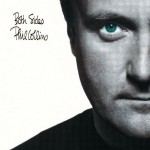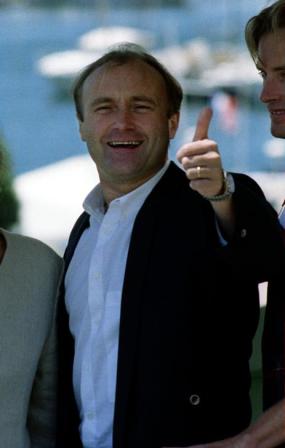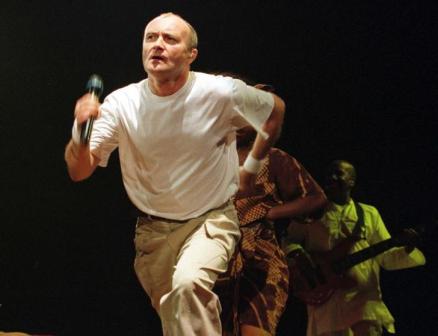Both times I interviewed Phil Collins (pictured at the Cannes Film Festival in May 1993) he was married, albeit to a different woman on each occasion.
If I were to talk to him again, I’d say (with apologies to Seinfeld), “Phil, you’re an Adonis! You should be swinging.” And I’d offer to stage an intervention should he ever announce plans to abandon singledom and walk down the aisle for a fourth time.
Marital woes aside, peer-reviewed studies have concluded that Phil Collins is the most normal rock star on the planet, and he’s happy to oblige in interviews. “If anybody in this business was to be closest to reality, if there was a box with all these rock stars in this box and the bottom fell out, I’d be the first out – purely because I’ve got my feet on the ground as much as I can possibly get them,” he told me in 1993, during our first encounter.
Five years later Collins was mortified to be introduced to the world as the latest addition to a widely mocked sub-species, the rock star who paints. I attended a soiree thrown in his honor backstage at the Greek Theatre in Los Angeles. A simple watercolor depicting an abandoned boat on a sun-soaked desert island was unveiled by his corporate sponsor. It was an uncomfortable “Emperor’s New Clothes” moment that he quickly defused by shaking his head and burying it in his hands as the guests surveyed his modest accomplishment. He joked that he was going to call the artwork “All washed-up and nowhere to go” before settling on “But I thought you packed the oars!”
 If there’s a reporter’s microphone within 50 yards, a cheery Collins will speak into it, full of self-deprecating humor. Q magazine, which he read devotedly, once called him a “professional good bloke.” When your hair falls out at an early age, you really have no choice but to drop the Eddie Vedder seriousness. Collins is one of those lucky guys who looks more handsome as he gets older. Free of the remnants of a short-lived civilization, he actually looks rather cutting edge. Oddly enough, his former Genesis bandmate Peter Gabriel went in the other direction: adorable back in the day, now a singing garden gnome.
If there’s a reporter’s microphone within 50 yards, a cheery Collins will speak into it, full of self-deprecating humor. Q magazine, which he read devotedly, once called him a “professional good bloke.” When your hair falls out at an early age, you really have no choice but to drop the Eddie Vedder seriousness. Collins is one of those lucky guys who looks more handsome as he gets older. Free of the remnants of a short-lived civilization, he actually looks rather cutting edge. Oddly enough, his former Genesis bandmate Peter Gabriel went in the other direction: adorable back in the day, now a singing garden gnome.
It was with high hopes of mutual backslapping bonhomie that I showed up to interview Collins in November 1993 for his first album in four years, a collection called Both Sides. His music isn’t my cup of tea, though I guiltily enjoyed his 1985 hit single “Sussudio
.” (Anything with horns in it is fine by me.) The new album was a chore to listen to, and I never played it again after the interview. Maybe I wasn’t old enough to appreciate it.
 “It’s just songs about actually hitting 41, 42, looking back at the first half. Time out, intermission, have your orange and a cup of tea,” he said, employing a sporting metaphor at odds with his soft physique. “Now look back at the first half of your life, the goals you missed, the chances you didn’t take. Will you get a chance to see through or will you be sent off?”
“It’s just songs about actually hitting 41, 42, looking back at the first half. Time out, intermission, have your orange and a cup of tea,” he said, employing a sporting metaphor at odds with his soft physique. “Now look back at the first half of your life, the goals you missed, the chances you didn’t take. Will you get a chance to see through or will you be sent off?”
Since I’m 42 as I write this remembrance, I gave Both Sides a spin to see if I could better relate to it. Nope, still got nothing. Every song sounds like a variant of “In the Air Tonight” but without the climax. Maybe it’s my limited attention span. The 11 songs average six minutes each. This is the problem when you not only write all the songs and produce the album but also play all the instruments. Working alone in his home studio, Collins didn’t have anyone to rein in his meandering impulses.
I didn’t raise my concerns to him at the time. That would be impolite. I took another tack that immediately backfired and turned the interview into a disaster. I emerged 30 minutes later feeling shell-shocked, knowing full well that Mr. Nice Guy was likely telling his handlers that I was an asshole and worse.
Of course it wasn’t my fault, as I’d later tell people. When he announced his plans to divorce eight months later, I attributed his foul mood during our interview to tension with his second wife, Jill, even though he told me at the time, “I’ve got a great marriage. Jill’s very understanding letting me write this stuff.”
However, after playing the interview tape back in 2011, listening to it for the first time in almost 18 years, I can safely say that I lit Phil’s fuse. From my first question – which was more of a statement rubbishing the syrupy sentiment of “Another Day in Paradise,” his big 1990 ballad about the plight of the homeless – he was on the defensive. That turned into hostility, and I kept making it worse as I argued with him about some of his new songs.
There’s nothing wrong with asking tough questions, but I failed to soften him up first, wrongly assuming that he would be goodhearted enough to roll with the punches. By the time I tried to mollify him, it was too late. A stock question halfway through the interview gave him the platform to vent. What annoys you? I innocently asked. He took a deep breath, walked over to a deli tray for some nibbles and sat down again.
“I don’t know you very well, I don’t know you at all,” he said. “It’s this coming into battle. I feel like our swords are drawn and they got drawn quite quickly.”
I gamely interjected that mine was a plastic sword, but he was in no mood for sweet talk. “Whatever,” he tersely replied, instantly placing himself among the early adopters of one of the world’s most annoying words. And out came a lengthy screed about his frustration with the press.
“If you went out of here and I said to someone, ‘What an asshole, what a fuckin’ cunt that guy was,’ you – if you knew that – you would actually be upset, wouldn’t you?”
I thought it best to go along with him and say yes, though I rather fancied the idea of gleefully telling my mates what Phil had said about me.
###
NOTE: This is an edited excerpt from my gossipy rock anthology, Strange Days: The Adventures of a Grumpy Rock ‘n’ Roll Journalist in Los Angeles, available here on Kindle or here as paperback
. For more info, go to strangedaysbook.com.
Copyright © 1993, 2013 by Dean Goodman. PLEASE DO NOT CUT AND PASTE THE WHOLE THING

